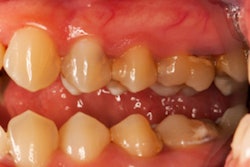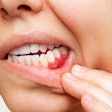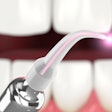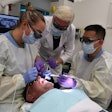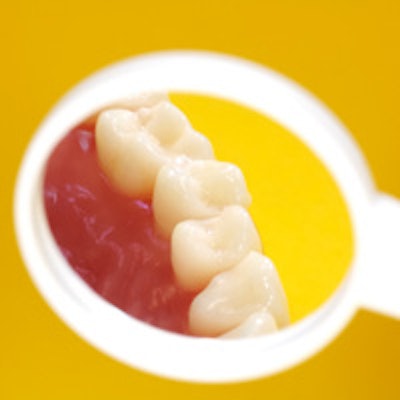
Poor oral health, including chronic periodontitis, is a common finding in hemodialysis patients. However, researchers from Brazil have provided preliminary evidence that periodontal therapy may improve the survival rate of these patients (Journal of Periodontology, November 14, 2013).
Although it is not possible to state that treatment of chronic periodontitis impacts outcomes when it comes to hemodialysis patients, the researchers clarified that their data can be very useful in defining the design of intervention trials in the future.
Chronic periodontitis is an important complication in hemodialysis patients because of its potential association with cardiovascular disease, as the study authors noted. It plays an important role in systemic inflammation, and most likely acts directly as a physiopathological link in the development of complications related to a higher mortality among these patients.
Many studies have shown that hemodialysis patients have poor oral health. A 2002 study that looked at the oral health of a 147 dialysis patients found that the dental health of these patients is poor and requires greater attention (Journal of the Canadian Dental Association, January 2002, Vol. 68:1, pp. 34-38).
Meanwhile, a 2009 study that looked at the effect of periodontal disease on the survival of patients with end-stage renal disease called for intervention trials to determine if treating periodontitis reduces cardiovascular disease mortality in dialysis patients (Kidney International, April 2009, Vol. 75:7, pp. 746-751) .
This association among periodontal disease, systemic inflammation, and adverse outcomes in hemodialysis populations warrants studies of oral health and periodontal therapeutic interventions, the authors of the current study explained.
"We had been interested in establishing a cohort of patients with periodontal disease since 2005, mainly for the association between genetic markers of susceptibility of periodontal disease in dialysis patients, a high-risk population," wrote study author Roberto Pecoits-Filho, MD, of the Pontifical Catholic University of Paraná School of Medicine in Curitiba, Brazil, and colleagues. "In the present study, we used the cohort to associate periodontal disease with mortality."
For this study, the researchers looked at 122 clinically stable hemodialysis patients who ranged in age 23 to 77 and were treated at the Cajuru University Hospital hemodialysis clinic in Brazil, then referred to the dental clinic of the Pro-Renal Foundation.
They carried out their study over a four-year period from August 2004 to April 2008. After enrollment, the study participants answered a questionnaire about their medical and dental histories, and routine laboratory measurements were taken as scheduled by the dialysis clinics.
The study participants' oral health was assessed by three examiners who noted the frequency of their visits to the dentist; dental floss use; decayed, missing and filled teeth index; gingival index; plaque index; calculus index; probing pocket depth; clinical attachment level; and presence of chronic periodontitis.
The study subjects were divided into three groups. One group consisted of subjects who received periodontal therapy, another included those who did not, and the third group of patients who did not have periodontitis were included as control subjects.
"The unique approach in our study was the possibility of analyzing the impact of treatment of periodontal disease on patient survival, since part of our cohort was treated and part was not, generating a control group with no intervention," Dr. Pecoits-Filho and colleagues wrote.
As part of the periodontal therapy, the study subjects were given oral hygiene instruction, antibiotic prophylaxis, and finally root planing and scaling, followed by rubber cup prophylaxis.
These patients were then followed in the dialysis clinic, and in the case of a mortality, the cause was noted.
The overall oral health of the study participants was considered poor, since 49% said that they visited a dentist less than once a year, 40% reported that they did not floss regularly, and 59% of them had periodontal disease.
Patients who had periodontal disease were older, more likely to have diabetes, and had more hypertension, as well as higher C-reactive protein (CRP) levels, higher phosphorous levels, and lower albumin levels, compared with patients without periodontal disease.
During the mean follow-up period of 64.1 ± 11.2 months, a total of 34 fatal events occurred with the leading cause of mortality being cardiovascular disease (53%). This was followed by infectious complications (20%).
Meanwhile, oral factors associated with death included decreased frequency of dental visits; nonuse of dental floss; increased decayed, missing, and filled teeth index; the presence periodontal disease; and untreated periodontal disease.
While patients with periodontal disease had a higher risk of death from all causes compared with those without it, this difference was not maintained after adjustments for confounders, the study authors noted.
However, they added that their research is the first to link periodontal diseases and mortality in hemodialysis patients.
"Our study is the first to show that treating periodontal disease may impact not surrogate markers of inflammation or cardiovascular disease, but in fact it could reduce mortality," the study authors wrote.
Poor oral health in chronic kidney disease patients, particularly in hemodialysis patients, is well-recognized, and these findings corroborate this view, they noted.
These findings highlight the need for preventive dental care programs and greater awareness of the impact of oral health on systemic complications in this particularly vulnerable group of patients, they added.
"Our hypothesis was that not only would periodontal be associated with high mortality but also that its treatment would have a positive impact," Dr. Pecoits-Filho and colleagues concluded. "Our results reinforce the importance of screening and treating periodontal disease in high risk patients, with a potential benefit in terms of their longevity."





